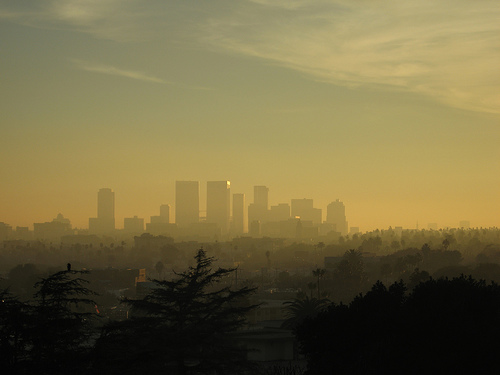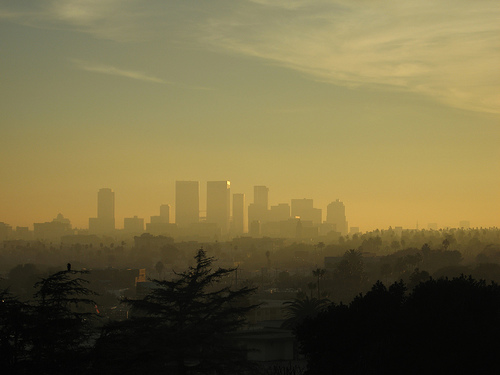 Prop 23 supporters are unable to see how the economy could survive without smog.Photo: Wes & EliIn this year’s election season, let me tell you what makes me mad as hell. I’m outraged at the idea of a law that would make you pay for home energy-efficiency improvements and a new energy-efficient car — but wouldn’t let you save money on either electricity or gasoline.
Prop 23 supporters are unable to see how the economy could survive without smog.Photo: Wes & EliIn this year’s election season, let me tell you what makes me mad as hell. I’m outraged at the idea of a law that would make you pay for home energy-efficiency improvements and a new energy-efficient car — but wouldn’t let you save money on either electricity or gasoline.
Here’s the amazing fact, though: There is no such law. Yet if you’ve been watching the fight to stall or overturn California’s climate law, AB 32, you might very well think there is, because that’s how opponents have presented it.
The real-life AB 32 calls for gradually rising standards for energy efficiency — but you get to keep every penny you save by reducing your energy bills. Thanks to that common-sense feature of AB 32, most analysts figure it’s about a break-even for the state and its households. You’ll spend some money on energy efficiency, and you’ll save some money by using less electricity and gasoline. You’ll come out about even — and you’ll help reduce greenhouse gas emissions and slow down global warming at the same time.
To its opponents, AB 32 looks like a dead loss, making you pay for energy conservation without getting any of its benefits. Where did the idea of the “all costs, no savings” law come from? Last year, lobbyists opposed to AB 32 hired two California State University business professors, Sanjay Varshney and Dennis Tootelian. They wrote about an energy savings law with no savings [PDF], as it might exist in a world quite different from the planet we actually live on. Varshney and Tootelian, who had no experience in this kind of analysis, decided that the benefits of AB 32 — the money you’ll save on your energy bills — were so uncertain that they should be ignored. That is, they estimated the savings to be exactly zero. They imagined that the costs, on the other hand, were enormously large.
In the strange world of Varshney and Tootelian, you’ll spend $2,000 every year on making your home more energy efficient, without ever reducing your energy bills. You’ll buy a car that gets better gas mileage, but you won’t save any money on gasoline. Instead, the mere presence of new, fuel-efficient cars on the road will somehow raise the costs of driving older cars; you’ll average $750 a year in increased gasoline and auto maintenance costs. And with everything else going up, food costs must be going up, too; let’s say you’ll spend, oh, maybe $900 a year more on food, due to the imaginary costs of energy efficiency.
This is the economic “research” that’s quoted as gospel truth by the advocates of Proposition 23, which would suspend AB 32. The numbers that are tossed around by Prop 23 fans, suggesting scary costs to the average household, come straight from Varshney and Tootelian. The Varshney-Tootelian numbers are even bigger for the alleged impacts on small businesses, based on a fact-free, back-of-the-envelope guess about the percentage cost increase caused by AB 32 — compounded by an elementary economic mistake that doubles the supposed losses to the state.
If you enjoy the statistical details behind all of this, take a look at my report to the California attorney general, called “Daydreams of Disaster” [PDF]. As I concluded there, the losses projected by Varshney and Tootelian “would be serious economic impacts — if they were real. They are, however, entirely unreal; they should be viewed merely as daydreams of disaster.”
And that is what makes me, as an economist, angry — the idea that statistical nonsense, unsupported by logic or evidence, is accepted and quoted as if it were solid facts. For those who like dreaming about disasters, there are quite a few movies that can be rented. For those who want to wake up and make sensible, fact-based decisions about California’s future, AB 32 is roughly a break-even proposition, and it is good for the environment besides. Prop 23, which would undo it, has got the numbers backwards.


